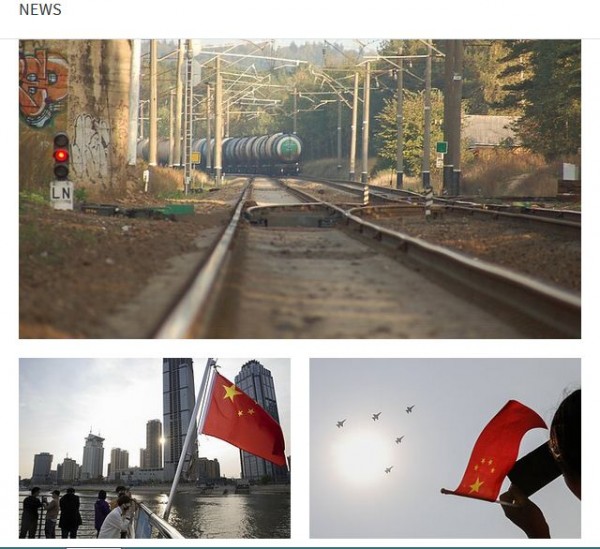News 2020.05.21 17:00 Beijing eyes Rail Baltica investment – analysis
News 2020.05.21 17:00
Paweł Paszak, Warsaw Institute
Railway in Lithuania (illustrative image) / BNS
Chinese investments are making their way into Rail Baltica, a strategic railway connecting Poland with Estonia, Latvia and Lithuania. Precedents in the Balkans indicate a successful bid may carry political implications, Warsaw Institute, a think tank in Poland, reports.
https://www.lrt.lt/en/news-in-...
Until recently, the prevailing belief was that China only carries out infrastructure projects in the developing countries as it is unable to compete effectively in the EU market. However, in recent years, Chinese companies have been successful in tenders organised in Central and Eastern European countries (17+1).
These include already signed and implemented contracts for the construction of an EU-funded bridge in Pelješac in Croatia (340 million euros), Budapest-Belgrade high-speed railway (2.1 billion US dollars) and a part of the S14 expressway in Poland (561 million Polish złoty).
The future of the contract worth 4 billion Polish złoty (around 877.6 million euros) for the construction of the Polish section of Rail Baltica (Czyżew-Białystok) is also at stake.
The consortium consisting of the Polish company Intercor and Chinese companies Sinohydro and Stecol won the tender, but due to appeals filed by the competitors, the contract was not signed as of May 14, 2020.
Another key logistics project, located on the outskirts of CEE, is the construction of an undersea tunnel between Tallinn and Helsinki, with an estimated cost of 15 billion euros.
Read more: Lithuania becomes China’s postal hub in Europe. Strings may come attached
China
China / AP
The project is the responsibility of FinEst Bay Area Development, which in 2019 signed a memorandum of understanding with three state-owned Chinese companies as well as an investment fund to provide financing and technical support for the project.
If one of the most ambitious infrastructure investments in the European Union was to be entrusted to the Chinese companies, this would significantly strengthen their position in subsequent tenders.
The tunnel’s project is still awaiting approval from the Estonian and Finnish authorities, but concerns about a surge of Chinese influence in the region might cause difficulties in obtaining the consent.
The above-mentioned examples from Poland, Hungary, Croatia and Estonia prove that construction companies from China are becoming increasingly active and efficient in the difficult EU market.
The procedural experience gained in previous tenders will facilitate participation in subsequent projects of this type in the EU. In the long-term perspective this will result in a growing competition for European and Polish construction companies.
An unquestionable advantage of contractors from the Middle Kingdom is the ability to easily acquire funds from Chinese state-owned banks, such as Exim Bank, Bank of China or China Development Bank.
According to the Polish Rzeczpospolita newspaper, only in the second half of 2019, Chinese contractors submitted bids in 10 out of 23 proceedings. The growing activity of Chinese companies raises objections from local contractors, as was the case with the construction of the S14 road and a section of the Czyżew–Białystok Rail Baltica railway line.
Polish entrepreneurs indicate that Chinese bids are characterised by significantly lower rates, often not corresponding to the real costs of the project. These companies have also no experience in functioning on Central European markets.
Until now, a Chinese company has been responsible for a serious contract only once. It took place in 2009, when COVEC was entrusted with the construction of two sections of the A2 highway for the amount of 1.3 billion Polish złoty (around 285.3 million euros).
In 2011, however, the company abandoned the construction site, leaving the highway unfinished, which contributed to the deterioration of attitudes towards the Chinese investments.
Lithuania is fighting off China’s attempts to gain a foothold in the country’s only seaport in Klaipėda, according to Lithuanian Defence Minister Raimundas Karoblis
Lithuania is fighting off China’s attempts to gain a foothold in the country’s only seaport in Klaipėda, according to Lithuanian Defence Minister Raimundas Karoblis / AP
Read more: China's push for Lithuanian port poses risk to NATO
Growing activity in the CEE part of the European Union is a relatively new phenomenon, but, in terms of the Western Balkans, Chinese companies are responsible for the completion of several projects which are strategic for the region.
These include, among others, highways: Bar–Boljare (Montenegro, 809 million euros), Pojate-Preljna and Novi Sad-Ruma (Serbia, 850 million US dollars), Preljina–Pozega (Serbia, 500 million euros), Kicevo–Ohrid (North Macedonia, 375 million euros) and Banja Luka–Prijedor (Bosnia and Herzegovina, 297 million euros).
The first investment is particularly interesting, not only because of its economic importance, but also because of its political implications. The highway is intended to connect the port in Bar on the Adriatic Sea with Serbia, which has no direct access to the sea.
The completion of the project will allow the Chinese to secure various interests simultaneously. The investment guarantees tangible financial benefits for the Chinese contractor, the loan from Exim Bank increases the possibility of political and economic impact on Montenegro and the highway will strengthen Serbia’s position as China’s main partner in the Western Balkans.
The Bar–Boljare link also shows the potential risks associated with China’s involvement in the transport sector. The loan for financing the venture has contributed to raise public debt to 79 percent of the country’s GDP, while in 2017 it equaled 66.3 percent.
The project is described by some media as a “highway to nowhere” due to its dubious profitability, lack of transparency and being a burden on public finances. As a consequence of the rapid increase in debt, the authorities in Podgorica were forced, among others, to temporarily freeze wages in the public sector and to waive social allowances for mothers.
The intensification of China’s involvement in the CEE infrastructure investment sector (17+1) is therefore a process that requires the attention of decision-makers and regional policy researchers.
This story was originally published by the Warsaw Institute, a Polish think tank focusing on transatlanticism and geopolitics.
Arvamus
TRENDING
























